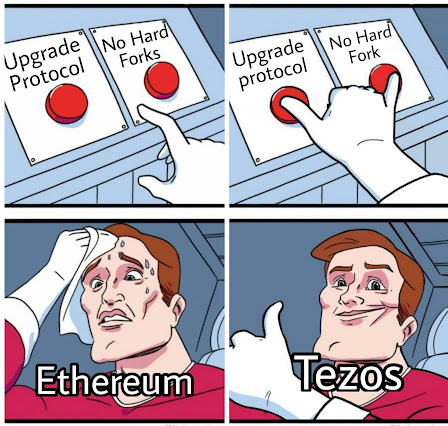What are a few exciting capabilities of Edo, the cutting-edge change concept on Tezos?
This week, Gabriel All four, Lead Developer at LIGO & Marigold, Mehdi Bouaziz, software program Engineer at Nomadic Labs, and Arthur Breitman, Early Architect of Tezos, joined a moderated discussion with TQ Tezos' Co-Founder Jacob Arluck. They shared many minds on ability areas for future improvement from a developer's attitude. They weighed in on how the modification system has evolved through the past four successful network progress into the present day proposal.
Additionally, they touched on how an expedited method fosters an extra frequent rollout of upgrades and functions in addition to the charges and benefits of, in keeping with Gabriel, a "top-down vs. bottom-up" method to featuring and imposing new processes.
Circulate this session to study what they'd to mention approximately useful (and no longer beneficial) packages of independent, innovative contracts and blockchain governance.
Adds two essential features: Sapling and BLS12-381 to allow privateness-keeping smart contracts and tickets for local permissions. Updates modification procedure utilizing decreasing length period to 5 cycles and including a 5th Adoption period. It also consists of minor Michelson upgrades.
The Edo protocol permits shielded transactions that are a need for some banking-like transactions. We should see it open up an entire host of smart contracts in any other case no longer feasible on every other chain. I'm sure other chains are considering it as nicely. That is one place where Tezos indeed leads the %.
Why is Edo being proposed when Delphi has most effectively been in location for short at the same time as? Even though Delphi went to stay on November twelfth, it turned into a proposal on September third. Within the intervening months, we've been challenging at work at the center Tezos software program, and we've made extensive improvements that we want to proportion with the users of the network. We've mostly finished some of the improvements that had been in progress when the interim Delphi update was proposed.
Most cryptocurrency networks can't be updated regularly; they haven't any mechanism that overcomes the excessive coordination charges related to protocol changes. Tezos, however, possesses an on-chain self-governance mechanism, in addition to an agent for self-amendment without forks. So we can recommend updates to the chain, which, if adopted via its users, are then automatically carried out. We intend to take total gain of that mechanism going ahead to make Tezos better and higher with each concept.
Sapling is a protocol initially evolved with the aid of the electrical Coin business enterprise for the Zcash venture, which implements shielded transactions. Our suggestion lets smart settlement developers, without problems, integrate Sapling of their smart contracts and create privacy-conscious applications. Because Tezos can be amended, it was feasible for us to feature this exciting new characteristic at once to Tezos itself.
Tickets are a handy mechanism for smart contracts to grant portable permissions to other smart contracts or problem tokens. While it's possible to achieve this with existing programming patterns, tickets make it a good deal easier for developers to write secure and compo-sable contracts.
The "adoption length" (occasionally referred to as the "5th length") is an essential improvement we've desired to make to the governance mechanism for a while. Like every other function of the protocol, Tezos protocol amendments may also make adjustments to the amendment method itself. Up till now, new variations of the protocol have long gone (that is, had been "activated") one block after voting has been completed, which in practice is simplest sixty seconds. This has made it challenging for some Tezos bakers, indexers, and other community customers to guarantee seamless enhancements of their nodes. We've additionally seen times where the absence of reality about whether an improvement could be followed prompted a few users to postpone arrangements until the ultimate moment.
Beneath the brand new gadget, instead of 4 periods of 8 cycles during voting, we recommend having five periods of five cycles. The recent fifth duration, the adoption length, can be a five-cycle (approximately weeks) hole between adopting the brand new protocol and the time while it's miles are activated. This can be a useful resource in assuring seamless protocol transitions. (We expect a few extra minor tweaks to the vote casting schedule may additionally arise incoming protocol proposals.)
A few readers may additionally note that Baking accounts, a feature that has been within the works for a while, isn't always covered in Edo. Even though the center Baking debts software program is complete and reliable, we are not satisfied that the migration mechanisms needed to update the chain when Baking debts are activated as seamless as we can lead them to. In the beyond, a few migrations have prompted delays to on-chain transactions going on around the time of an upgrade, and our assessments of the Baking accounts migration suggest that it may take a giant period. Going ahead, as we will be upgrading the protocol pretty regularly, we intend to limit those migration instances and any disruption to the network. We are consequently operating on optimizing our migration mechanisms.
Following our recent coverage of not slowing down the deployment of finished functions for ones that are not but finished, we've held Baking debts back for the moment. We are hoping that Baking bills can be a feature of the subsequent protocol thought, which, if Edo is followed, have to arise in about three months.


إرسال تعليق